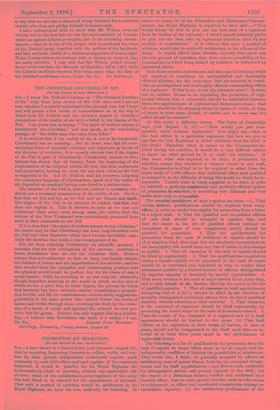THE CHRISTIAN DOCTRINE OF SIN.
[TO THE EDITOR OF THE "SPROTATOR.1
know Dr. Tulloch's lectures on "The Christian Doctrine of Sin " only from your review of the 12th inst., and I am not sure whether I correctly understand him through you, but I hope you will permit a few words of remonstrance as to the way in which both Dr. Tulloch and the reviewer appear to identify a recognition of the reality of sin with a belief in the dogma of the Fall. You quote him as saying, "The spirit of modern science is consistently non-Christian," and you speak, in the concluding passage, of "the fallen man who came from Eden."
It is obvious that if the reality of sin is not to be recognised, Christianity has no meaning ; but to those who feel the over- whelming force of scientific evidence and argument in favour of the doctrine of evolution, it is equally obvious that if the dogma of the Fall is part of Christianity, Christianity cannot be true. Science has shown that all history, from the beginning of the condensation of the original nebula till now, has been continuous and progressive, leaving no room for any such event-as the Fall is supposed to be. Yet Dr. Tulloch and his reviewer, adopting the customary language of Christendom, speak as if the reality of sin depended on mankind having once lived in a sinless state.
The doctrine of the Fall is, however, neither a necessary con- dition nor a necessary consequence of the reality of sin. Sin is a fact that we feel and see, as we feel and see disease and death. The dogma of the Fall is an attempt to explain that fact, but does not explain it. This is obvious, so soon as we cast our traditional ideas away,—and among them, the notion that the writers of the New Testament were miraculously preserved from error in their comments on the Old.
If it is true that "the spirit of modern science is non-Christian," the reason may be that Christianity has been long identified with the Fall and other doctrines which have become incredible, espe- cially the doctrine that death is the consequence of sin.
But far from rejecting Christianity on scientific grounds, I maintain that the new conceptions of the universe constitute a better foundation than the old for Christian faith. Modern science does not endeavour to hide or deny, but frankly admits, the failures of nature and the imperfection of the universe, and hes thus receded from the untenable and embarrassing position that the physical world would be perfect, but for the chaos of man's moral nature ; while by revealing to us not only the admirable though imperfect harmony of the world in which we live and of which we are a part, but, in some degree, the process by which that harmony has been evolved—matter constituting a prepara- tion for life, and life for consciousness—science dimly suggests the possibility of the same power that existed before the forces of nature and works through them crowning the work by the evolu- tion of a world of moral and spiritual life, whereof we now per- ceive but the germs. Science can only suggest this as a possibi- lity,—I believe that Revelation has made it a reality.—I am,


































 Previous page
Previous page